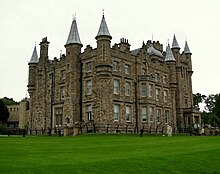Northern Ireland Executive
In January 2017, the then deputy First Minister Martin McGuinness resigned in protest over the Renewable Heat Incentive scandal and the Northern Ireland Executive consequently collapsed.
[5] The governing of Northern Ireland fell to civil servants in a caretaker capacity until January 2020, when the parties signed the New Decade, New Approach agreement and an Executive was subsequently established.
[7] No agreement on power-sharing was made after the 2022 Assembly election, and from October 2022 to February 2024, Northern Ireland was governed by civil servants.
There were some calls for the SDLP and the UUP to enter opposition after the 2007 Assembly elections,[13] but ultimately the two parties chose to take the seats in the Executive to which they were entitled.
In 2010, an exception to the D'Hondt system for allocating the number of ministerial portfolios was made under the Hillsborough Castle Agreement to allow the cross-community Alliance Party of Northern Ireland to hold the politically contentious policing and justice brief when most of those powers were devolved to the Assembly.
Under D'Hondt, the SDLP would have been entitled to the extra ministerial seat on the revised Executive created by the devolution of policing and justice.
Accordingly, both the UUP and SDLP protested that Alliance was not entitled, under the rules of the Good Friday Agreement, to fill the portfolio and refused to support this move.
On 26 August 2015, the UUP announced it would withdraw from the Executive and form an opposition after all, in response to the assassination of Kevin McGuigan.
The current system of devolution has succeeded long periods of direct rule (1974–1999 and 2002–2007), when the Northern Ireland Civil Service had a considerable influence on government policy.
The Department of Culture, Arts and Leisure states that a Strategy for Indigenous or Regional Minority Languages "will be presented to the Executive in due course".
It was short-lived, collapsing on 28 May 1974 due to the Ulster Workers' Council strike, and the Troubles continued in the absence of a political settlement.
[32] A full Executive was nominated on 29 November 1999 and took office on 2 December 1999, comprising the UUP, SDLP, Democratic Unionist Party and Sinn Féin.
[33] Devolution was suspended for four periods, during which the departments came under the responsibility of direct rule ministers from the Northern Ireland Office: The 2002–2007 suspension followed the refusal of the Ulster Unionist Party to share power with Sinn Féin after a high-profile Police Service of Northern Ireland investigation into an alleged Provisional Irish Republican Army spy ring.
[47] On 26 August 2015, the UUP withdrew from the Executive in protest over the alleged involvement of members of the Provisional IRA in the murder of Kevin McGuigan Sr.[48] Danny Kennedy MLA's position as Minister for Regional Development was later taken over by the DUP, thereby leaving four Northern Irish parties in the power sharing agreement.
[50] Following the signing of the Fresh Start Agreement, Peter Robinson announced his intention to stand down as leader of the DUP and First Minister of Northern Ireland.
Ministerial positions were proportionally allocated between the DUP and Sinn Féin, with independent unionist Claire Sugden serving as Minister of Justice.
The government collapsed on 16 January 2017, after Martin McGuinness resigned in protest over the Renewable Heat Incentive scandal.
[54] The main purpose of the bill was to prevent another election and keep Northern Ireland services running in the absence of a functional devolved government.
However, two Labour MPs, Conor McGinn and Stella Creasy, added amendments that would legalize same-sex marriage and liberalize abortion law (both devolved issues) if the DUP and Sinn Féin could not come to an agreement before 21 October.

